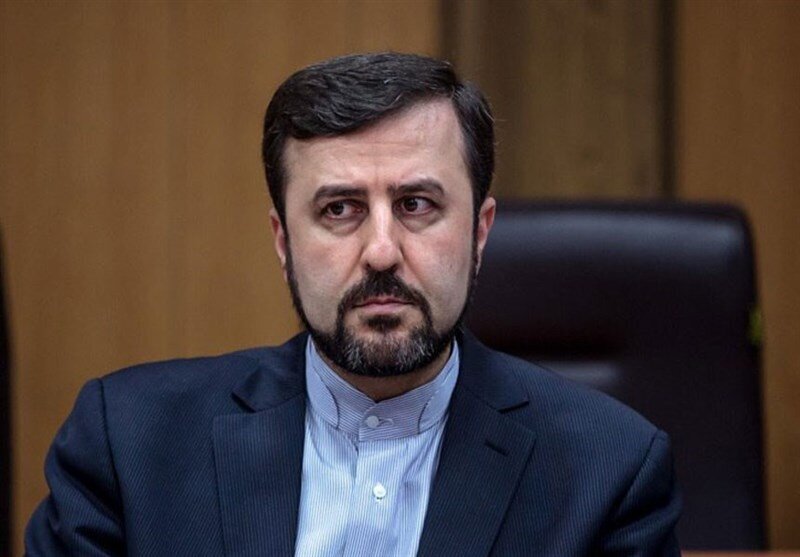Iran hits back at IAEA chief’s call for new agreement, says JCPOA not renegotiable

TEHRAN – There will be no renegotiations on the 2015 Iran nuclear deal and even if the deal is revived there would also be no need for a new document on the UN atomic watchdog’s role in implementing the deal, Iran said in response to UN atomic watchdog chief Rafael Grossi’s remarks on the need to strike a new agreement to revive the Iran deal.
Iran has called on the new U.S. administration to unconditionally return to its commitments under the nuclear deal –officially called the Joint Comprehensive Plan of Action (JCPOA) – and avoid any attempts to expand it.
During his election campaign, U.S. President-elect Joe Biden has said that he will return to the JCPOA if he is elected president. After winning the November election, he said he still stands by his promise to return to the deal but doing so would be hard and difficult.
Biden has not officially called for a new agreement with Iran, nor has he said the deal should be expanded. But the European signatories to the JCPOA – France, Germany and the UK (E3) – have called for a new nuclear deal with Iran that includes, inter alia, Iran’s missile program and its influence in the region.
Grossi, who heads the International Atomic Energy Agency (IAEA), has echoed a similar call although he didn’t refer to Iran’s missile program and its regional influence.
In an interview with Reuters, Grossi claimed there had been too many breaches for the JCPOA to simply fall back into place.
“I cannot imagine that they are going simply to say, ‘We are back to square one’ because square one is no longer there,” he said, adding, “There is more (nuclear) material, ... there is more activity, there are more centrifuges, and more are being announced. So what happens with all this? This is the question for them at the political level to decide.”
Asked if that meant there would have to be a ‘deal within the deal’, he said: “Oh yes, oh yes. Undoubtedly.
“It is clear that there will have to be a protocol or an agreement or an understanding or some ancillary document which will stipulate clearly what we do,” he said.
“What I see is that we’re moving full circle back to December 2015,” Grossi said, referring to the month before the deal’s restrictions were put in place. “If they want to do it (comply), they could do it pretty fast. But for all of those things we had a charted course.”
Iran hit back at Grossi’s remarks, saying they are “absolutely beyond the mandate” of the IAEA.
“1. As I said before, @iaeaorg sole role is to monitor and verify the voluntary nuclear-related measures as detailed in the JCPOA and to provide regular factual updates in this regard. Presenting any assessment on how the commitments are implemented (e.g. referring to breach) is absolutely beyond the mandate of the Agency and should be avoided. 2. @iaeaorg played its part during negotiations on the JCPoA. The commitments of the parties and @iaeaorg tasks have been delicately drafted and agreed and each side knows what to do to implement the deal,” Kazem Gharibabadi, Iran's ambassador and permanent representative to Vienna-based international organizations, said in a tweet on Friday.
He was responding to the Grossi interview with Reuters.
Gharibabadi added, “3. There would be no renegotiation on the Deal and in case of its revival, there is no necessity for a new document on the Agency’s role. It’s not needed to complicate the situation.”
Iranian officials have recently voiced opposition to any renegotiations on the JCPOA, saying that the deal had once been negotiated and is no longer renegotiable. Iranian President Hassan Rouhani said on Monday that the JCPOA is not renegotiable.
“There is one JCPOA that has been negotiated and agreed — either everyone commits to it or they don't,” the president said.
Rouhani also ruled out negotiations on Iran’s missile program and its influence in the region, saying that the Americans had tried to add the missile issue to the JCPOA but Iran rejected the issue.
“The Americans were trying for months to add the missile issue (to the nuclear talks) and this was rejected. Trump was uninformed and did not know about the matter, but Mr. Biden is well aware of the details of the deal,” the Iranian president noted, adding, “I have not heard Biden say that we have to reach another agreement in order to return to the nuclear deal, that is what Trump says.”
Earlier in November, Iran’s Foreign Minister Mohammad Javad Zarif said that the JCPOA is non-renegotiable, though Iran is ready to negotiate the U.S. return to the nuclear deal.
“The US is still a UN member,” Zarif said in a tweet, adding, “If it meets its obligations as such under UNSCR 2231, we will fulfill ours under the #JCPOA. If the US then seeks to re-join the JCPOA, we're ready to negotiate terms for it to regain its 'JCPOA Participant' status.”
SM/PA
